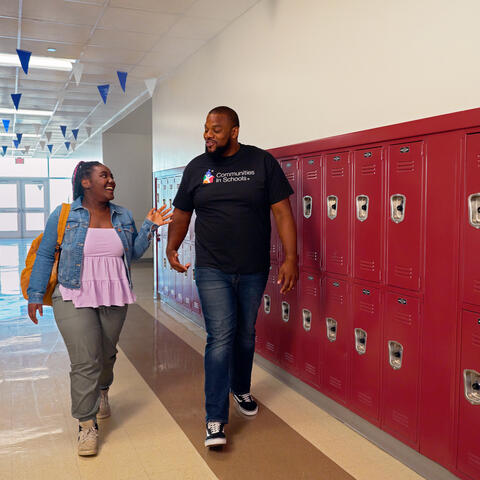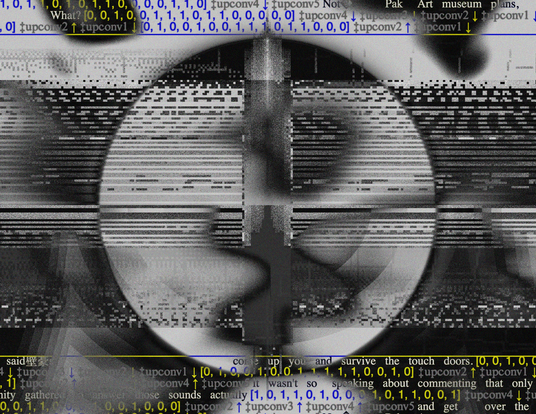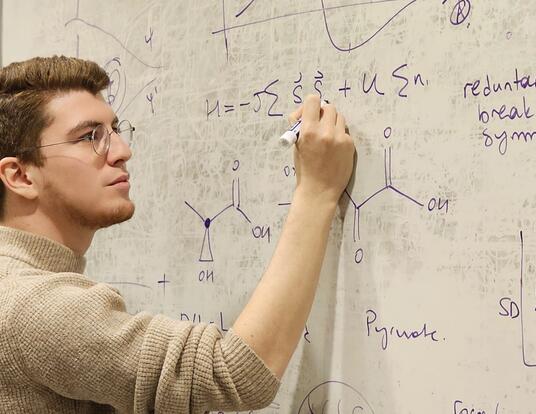Sanford Greenberg: 2023 Centennial Medal Citation
Charles Darwin said that a man’s friendships are one of the best measures of his worth. By this reckoning, Sanford Greenberg is leading a life of value beyond measure. Through civic-minded entrepreneurial efforts and a passion for helping others, Greenberg has overcome staggering adversity to become a singularly successful business leader and philanthropist.
Greenberg grew up in Buffalo, New York, and was just five years old when his father passed away; he spent his early childhood in poverty. He emerged from these difficult circumstances triumphantly, as president of his high school class—and prom king!—bound for Columbia University. Talented and ambitious, he aspired to study government and law and was a fervent supporter of John F. Kennedy’s presidential campaign. But at the age of 19, Greenberg experienced an unthinkable tragedy: a doctor’s misdiagnosis left him blind.
After the loss of his sight, Greenberg defied the odds. He returned to Columbia, was elected president of his class, and graduated Phi Beta Kappa in 1962. He earned his PhD in government at Harvard in 1965, attended Oxford on a Marshall Scholarship, and was admitted to Harvard Law School. In 1966, he left Harvard to complete a yearlong White House fellowship, for which he traveled throughout Europe and worked with NASA and the Departments of Defense, State, and Commerce. When his fellowship ended, he started his own technology company, which helped design the computer system for the first Apollo Lunar Module, a fitting project for someone so inspired by President Kennedy and his moonshot aspirations.
This was just one of many successful business ventures. While at Harvard, Greenberg invented a machine that could speed up tape-recorded human speech without distortion. This same technology is convenient today for those who want to listen to podcasts or audiobooks at double speed, but for the blind, it represents something more significant: the opportunity to absorb words at the same rate as a sighted person. Greenberg’s compressed-speech machine has benefited millions of blind students. He also helped improve human health by creating the first global database tracking antibiotic resistance and by serving on the National Science Board at President Bill Clinton’s invitation.
When Greenberg lost his sight, he made a promise to do everything he could to prevent others from suffering the same fate. He has made good on that promise. He singlehandedly put blindness on the global agenda at the World Economic Forum in Davos, Switzerland. In 2012, he launched the Greenberg Prize to End Blindness. And in 2021, Johns Hopkins University, where Greenberg is an emeritus trustee and former chair of the Wilmer Eye Institute board, established the Sanford and Susan Greenberg Center to End Blindness.
Alfred Sommer, MD ’67, dean emeritus of the Johns Hopkins Bloomberg School of Public Health, has known Greenberg for more than 30 years. He recalls being astonished by Greenberg’s skill on the basketball court, even without the benefit of sight. “Sandy’s ready to take on everything,” says Sommer. “He is in control, and he does not in any way give ground because he’s blind. He’s in charge, regardless of what the situation is. He listens and he digests, and he comes up with critical questions. Sandy’s got a lot of experience, a lot of wisdom, and he’s someone who really goes out of his way for his friends.”
The author Margaret Atwood AM ’62—a 1990 Centennial Medalist—was a volunteer reader for blind students while she and Greenberg were in graduate school at Harvard, though the two did not meet until years later. In an afterword to Greenberg’s memoir, Atwood observes, “How devastating it would have been to be told at such a young age that you would never see again. What willpower and hard work it would have taken to paddle upstream against such a strong current. And how encouraging it is to others to hear that it can be done, because Sanford Greenberg did it—with a little help from his friends, but we all need that.”
And such friends. Michael Bloomberg calls Greenberg “a role model for all of us.” His neighbor Ruth Bader Ginsberg was, in her words, “captivated by his bright mind, ready wit, and indomitable spirit.” His wife, Sue, his high school sweetheart, has stood by his side through every moment, high and low. And his dearest friend, Art Garfunkel—his roommate at Columbia, the godfather of his children, and the architect of a turning-point moment in Greenberg’s young life, when he discovered he could, despite his lack of sight, navigate the treacherous New York City subway system on his own, and therefore face any other challenge that might come his way—Garfunkel simply says, “My friend is my gold standard of decency.” Sanford Greenberg is a friend to humankind, a champion of those in need, and an exemplar for us all.
Sanford Greenberg, for your brilliant work on technologies and ventures that have benefited so many, for your indefatigable commitment to ending blindness, and for your forthright and openhearted embrace of life and the people around you, we are proud to award you the 2023 Centennial Medal.
Get the Latest Updates
Join Our Newsletter
Subscribe to Colloquy Podcast
Simplecast





